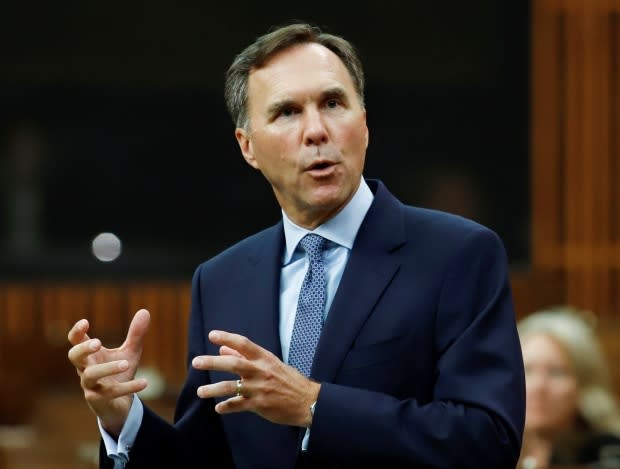The inflation threat hasn't gone away as governments borrow and spend: Don Pittis

If economics were as exact a science as some economists might like us to think, the debate about inflation would be over.
Currently, the mainstream view as gleaned from many credible economists and reports from financial journals is that inflation remains off the table — and 40 years of stable prices will continue.
In many ways that is reassuring; but there is another view. While the idea that we are nearing an inflationary turning point will be seen by many as contrarian, the arguments are by no means preposterous and are worth hearing even if just to confront and disprove.
If we do see a return to inflationary pressure and the rising interest rates that will be needed to contain it, Finance Minister Bill Morneau's plan to borrow now for the long-term at low current rates may have other consequences.
Prices falling not rising
As the pandemic kills off jobs and spending power, as companies such as Brooks Brothers and David's Tea last week joined many others in bankruptcy protection, most economists say the big worry right now is not inflation but its opposite, deflation.
Certainly in the short term, there are plenty of strong arguments for fearing falling prices — a trend considered ominous because it makes consumers hold onto their cash in expectation prices have even further to fall.
A decline in consumer demand from people staying home or living on reduced incomes should in theory lead sellers to hold prices down. Similarly a sharp decline in employment weakens the power of workers to bid up wages. Both are disinflationary.

Finance Minister Bill Morneau presented his fiscal snapshot last week, but his is not the only government borrowing to spend.
One fresh bit of independent evidence has arrived from the market in something called inflation-linked bonds; they have recently earned record gains compared to regular bonds.
"The performance is owed mainly to investors seeking protection from price pressures that may emerge from stimulus efforts and a return to economic growth," reported business news service Bloomberg last week.
In other words, rather than just talk, some investors were laying down their cash in anticipation of a switch to rising prices.
Gains in those inflation-linked securities were especially remarkable because, for all the reasons mentioned above, consumer prices have actually been falling. That means economists who insist inflation is on its way are effectively looking through the current downturn to what comes next.
"The current recession is deeply deflationary for the next few quarters, but our analysis points to higher and more volatile inflation in the long-run, and we think the market is not priced for it," said a report on inflation by the Man Institute, a subset of the British finance giant best known outside the financial world for its contributions to the Man Booker Prize.
'Responsibly irresponsible'
The report, summarized in the Financial Times Alphaville with the unambiguous title Inflation is coming, makes the case that a confluence of factors, abetted by massive government coronavirus spending, means inflationary pressures will return after a 40-year absence.
The inflationists say that unlike the surge of money added to the economy in 2008 which mostly went into the financial sector and stayed there, this time the cash is ending up as fiscal spending in the regular economy as governments bail out consumers.
They say fear of the dire effects of deflation means governments and central banks will be willing to put up with inflation to avoid the greater risk of its opposite.
"They will attempt to be 'responsibly irresponsible' now in order to shock inflation expectations higher," said the Man Institute report.
WATCH | Bill Morneau on $343B deficit, post-pandemic recovery:
Friday's Canadian job creation numbers came in well above expectations, hinting at what could happen if the economic recovery kicks in more quickly than expected while all that additional fiscal stimulus is still active in the economy.
But inflationary pressure does not mean inflation. Central banks can raise rates to stop it, but as strategists with the asset manager Blackrock suggested in a recent report, that is something they may wish to avoid.
Rising interest rates would have disruptive effects on heavily indebted businesses and consumers. If governments are forced to renew existing debt at higher rates, the so-called "rollover risk," high rates could also make borrowing costs on large debt untenable.
"It may eventually have to be dealt with through austerity, default or inflation," said the Blackrock investment outlook. "Inflation could be seen as the most politically palatable solution."
The inflationists may not have it right, but if rising prices or rising interest rates due to an increase in inflationary pressures come to pass over the next decade, the Man Institute economists are likely right in saying it will be "messy."
"We think it is possible that financial markets are on the cusp of a once-in-a-generation regime change that could create havoc for savers and investors."
Follow Don on Twitter @don_pittis


